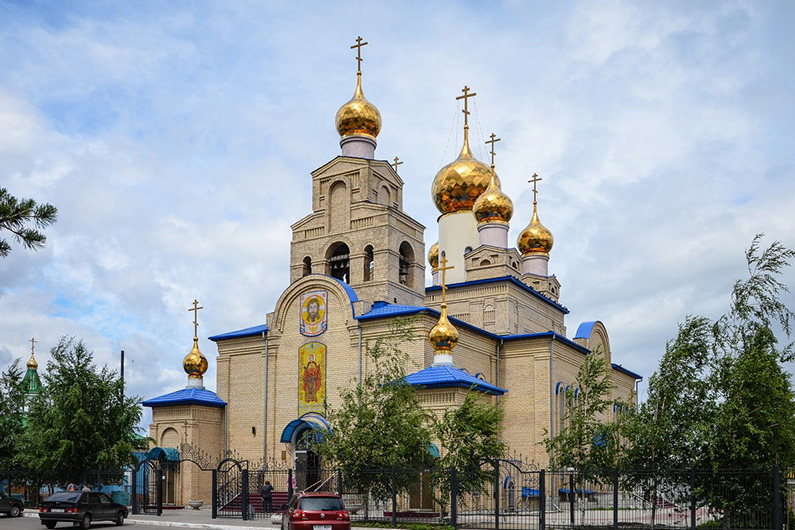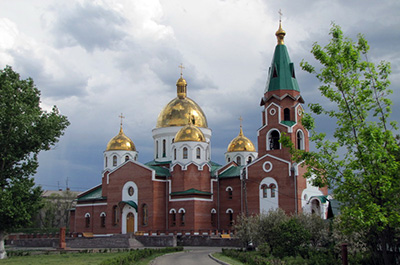
Appeal of Metropolitan of Astana and Kazakhstan Alexander before the start of the Lent
- 02.03.2022, 10:50
- Новости на английском языке

All honorable fathers, dear brothers and sisters!
On March 7, Great Lent begins - a sacred period of intense prayers, abstinence and spiritual exploits, which renews our lives and prepares for the meeting of the world-saving feast of the bright Resurrection of Christ.
“Now has come, the time has come for exploits - the field of fasting. Let us all begin it diligently, bringing to the Lord as gifts of virtue,” the Holy Church calls us in one of the first Lenten hymns. Let us make every effort to support each other on this path and patiently strengthen the weak, let us try to listen to spiritual mentors with humility and diligently visit the temples of God. Let us move from week to week to the great Easter joy, relying on the power of God, which is accomplished in weakness (2 Cor. 12:9) and makes everything impossible possible, transforming us, earthly and sinners, into new people - the children of the Kingdom of God.
The Church of Christ prepares us in a special way for the Great Lent. The images of the publican and the Pharisee, the prodigal son and the Last Judgment pass before our inner gaze; we remember the sin of the first man and his expulsion from the Paradise. From the penitent publican we learn humble prayer; the story of the prodigal son reminds us of the boundless mercy of God, which surpasses all human sinfulness; the story of the Last Judgment warns us against carelessness and negligence to the soul salvation. In the biblical story about the expulsion from Paradise, the destructive power of lawlessness and the woeful consequences of violating God's commandment was shown. We should always keep all these lessons in mind as a guide to a correct spiritual life.
Lent gives us a sense of responsibility for our own lives and for the fate of our neighbors and makes it possible to see ourselves before God in the light of eternity. Sacred prayers and abstinence cast out the darkness of the sin from our souls. At each Great Lenten mass of the Presanctified Gifts, there is an exclamation: "The Light of Christ enlightens all." We are called to be enlightened by the spiritual power of the Lord, who “The light shines in the darkness, and the darkness has not overcome” (John 1:5). Life in Christ is not just a rejection of evil and outward moral improvement, everything is much more serious and deeper. The goal of a Christian's life is the acquisition of the grace of the Holy Spirit, the transfiguration of the human soul by Divine power; it begins with sincere and deep repentance, the correction of the life according to the Gospel.
How to correct life in accordance with the gospel message? We must remember the main content of the words of the Lord Jesus Christ, his instructions and commands. The Savior summed up the entire Divine Revelation that was given to humankind from the beginning of time, “On these two commandments hang all the law and the prophets” (Matt. 22:40) - love for God and love for neighbor. Not words, not outward appearance, but love manifested through compassion, kindness and mercy makes us not strangers, “but fellow citizens with God’s people and also members of his household” (Eph. 2:19). The Lord is speaking to us by saying: “By this everyone will know that you are my disciples, if you love one another” (John 13:35). Therefore, let us endeavor to make the time of Great Lent a school of love. You need to start with the simplest thing - an attentive attitude to your everyday speech. “Consider what a great forest is set on fire by a small spark” (James 3:5, 6), warns the apostle James. As flames of Gehenna slander must be avoided, so that, as the apostle Paul instructs, “Do not let any unwholesome talk come out of your mouths” (Eph. 4:29). “He who has not poisoned his ears and tongue with slander is filled with the medicine of love. Whoever does not defile his mouth with slander, his lips smell with the fragrant of fruits of the Holy Spirit,” teaches St. Ephrem the Syrian.
There is an ancient legend about St. Macarius the Great. Once this elder sent his disciple to obedience, the student went and met on the way a pagan priest who was carrying a bundle of firewood, the student shouted to him: “Where are you going, demon?”. The priest got angry and severely beat the monk. After some time the Monk Macarius met the same priest and said: “Peace be with you, hardworking man!” The priest asked: "What did you see good in me, that you greet me like that?" The elder answered: “I greet you like that, because I see your industriousness.” The idolater said: “I am touched by your words, and I understood that you are a man of God.” He fell at the feet of the monk and exclaimed: “I will not leave you until you make me a Christian,” and he went after Saint Macarius. Soon after the baptism of the priest, following his example, many of the Egyptian pagans were baptized. After this, the monk said: “You should know now that an evil word makes the good ones evil and on the contrary a good word makes the evil good.”
It is important to remember that any real victory over passions, any overcoming of the sins, as well as the acquisition of virtues, cannot happen by itself, without any help from above. Human spiritual and mental nature is deeply damaged. “For I do not do the good I want to do, but the evil I do not want to do – this I keep on doing” (Rom. 7:19), the Apostle Paul gives an example of this tragic state. In order to renew, to recreate in us the image and likeness of God, grace-filled means are given to us in the Church of Christ, the most effective of which are the holy Sacraments, Confessions and Communions. Repentance and the communion of the holy Mysteries of Christ overcome the abyss between God and man, which arose as a result of the Fall of man. According to the word of Holy Scripture, through Communion a Christian becomes a new person who proclaims to the world: “I no longer live, but Christ lives in me” (Gal. 2:20). St. John Chrysostom says that those who have approached at the Liturgy to the Chalice of Life become “relatives” of Christ and are awarded the greatest honor of being His “brothers and friends”. Hieromartyr Ignatius of Antioch adds that in this Sacrament we become “Christ-bearers and God-bearers.” The Holy Mysteries of Christ for us are the pledge of eternal life, the pledge of our immortality. The Lord Savior made this promise: “Whoever eats my flesh and drinks my blood has eternal life, and I will raise them up at the last day” (John 6:54).
Nothing can hinder our salvation if we ourselves will not shut ourselves off from God, if we deceitfully will not put off the correction of life “until later”. The condition for the beginning of Lenten labors and the first step towards the acquisition of gospel love, “which binds them all together in perfect unity” (Col. 3:14), is the generous forgiveness of offenses to our neighbors, to all with whom the Lord has judged us to go through life. We will forgive those who hate us by the Resurrection - we will forgive in the name of the Crucified and Risen Savior, with good deeds and words, we will restore the world in order to boldly repeat the words of the prayer: Father, forgive us our debts, as we also have forgiven our debtors (Matthew 6:12). If we forgive each other, then God will also forgives us, only in this way the conscience awakened and cleansed. The grace-filled light that every person seeks and longs for reigns in the heart.
I congratulate the Orthodox flock of Kazakhstan with the beginning of the Great Lent and call on all blessings of God and mercy of our Most Holy Lady Theotokos and Ever-Virgin Mary. “Keep yourselves in God’s love as you wait for the mercy of our Lord Jesus Christ to bring you to eternal life” (Jude 1:21).
HEAD OF THE METROPOLITICAL DISTRICT RUSSIAN ORTHODOX CHURCH IN THE REPUBLIC OF KAZAKHSTAN

METROPOLITAN OF ASTANAI AND KAZAKHSTAN





















